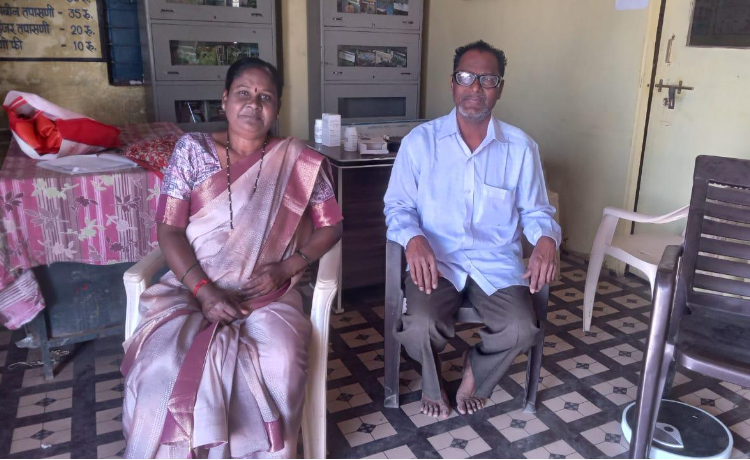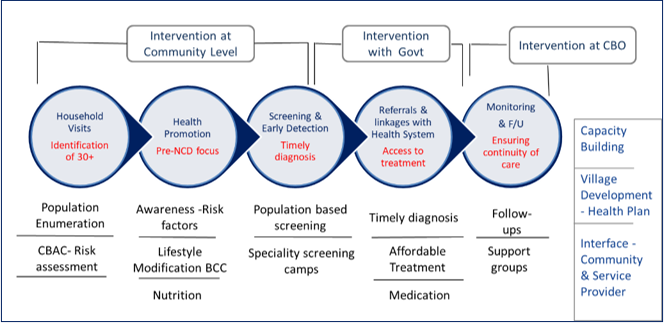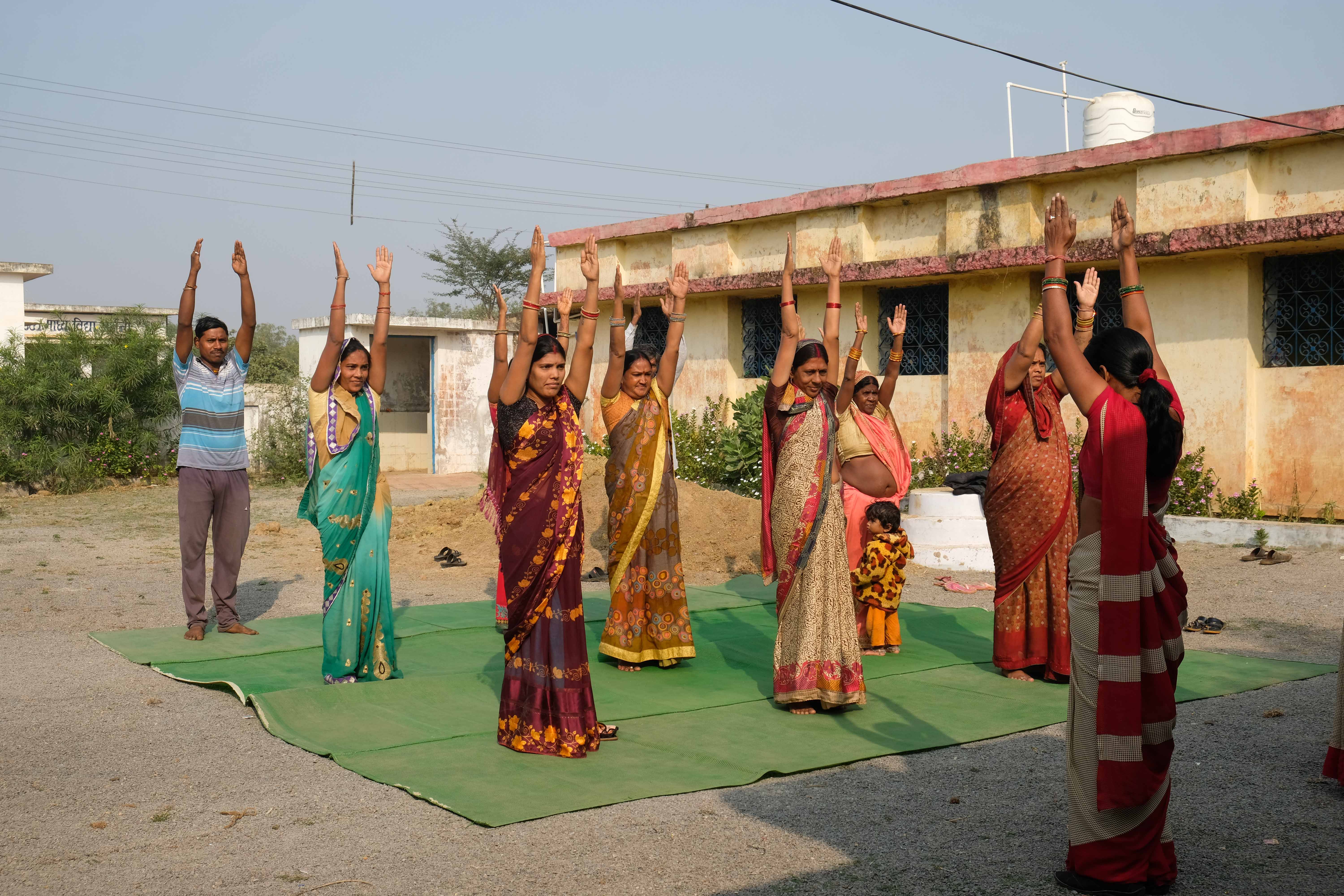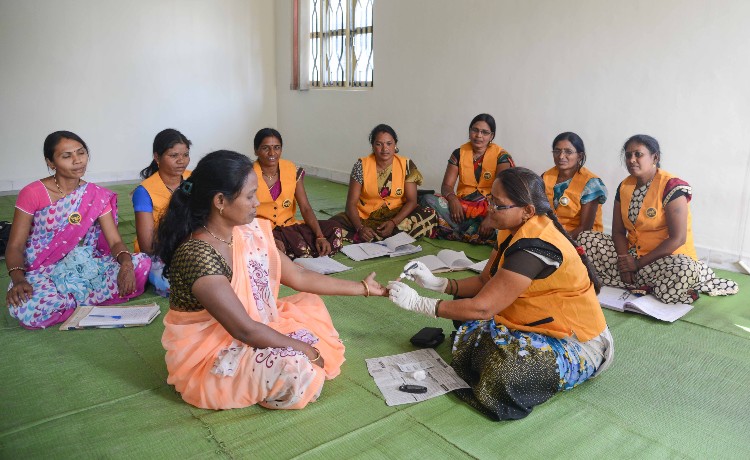Picture the sun rising over the fields, casting a golden hue as groups of villagers gather for their daily exercise routines. This scene, traditionally uncommon in rural India, is becoming a symbol of change to combat the rising incidence of non-communicable diseases (NCDs). Among these groups in Chandrapur, Maharashtra are Sunita Thamke and her husband Vinod Thamke.
Sunita and Vinod's journey towards a healthier lifestyle began when Ashwini a Sakhi from the Ambuja Foundation, advised them to start exercising regularly to manage Vinod’s high blood pressure. They joined a walking group that had kickstarted in the village, and made significant changes to their diet - thanks to Sunita’s participation in monthly food demonstrations at their local Ambuja Foundation Nutrition centre. This was just the beginning of a new, ‘healthier’ way of being...

For many decades, India’s primary health focus was on combating communicable diseases. While these efforts successfully reduced morbidity and mortality rates, non-communicable diseases like diabetes, hypertension, and cardiovascular diseases have been rising rapidly, even in rural areas. Traditionally, one might expect lower NCD prevalence in rural populations due to their more active lifestyles. However, research indicates otherwise. Factors such as behavioural and lifestyle risk factors, poor awareness about NCDs, limited access to quality healthcare, and inadequate treatment-seeking behaviour contribute significantly to this issue. For instance, the National Family Health Survey reported higher tobacco use in rural areas compared to urban regions. Additionally, the Indian Council of Medical Research India Diabetes Study found that diabetes awareness is significantly higher in urban areas (58.4%) than among rural residents (36.8%).
To address this growing challenge, Ambuja Foundation has been implementing several education, awareness, and support programs aimed at promoting healthier lifestyles in rural India. Through a network of trained Sakhis, there are currently 10 programs operating across more than 300 villages, with centres in 10 locations. These initiatives follow a holistic approach, focusing on both prevention and management of NCDs.

Ambuja foundation takes a holistic approach to tackling non-communicable diseases in rural communities. Work focuses on 2 distinct groups that require curated interventions.
The first is a large chunk of population which is unaware and has not been diagnosed. They may be suffering from uncontrolled diabetes and hypertension, require screening, diagnosis and medications to control the conidition and avoid life threatening complications.
The second target group is a section of the population who are at the pre-NCD stage. These people require an awareness and focus on lifestyle modifications to halt the prevalence and onset of NCDs.
Ambuja Foundation has very focused interventions in addressing the both groups by doing home visits and risk assessments and creating awareness on modifiable and non-modifiable risk factors and controlled High-Fat-Salt-Sugar and vegetables consumption as well as physical activity. Initial steps is to mobilize the community for screening camps once a year in village through PBS-population based screening, identification of high risk and link to PHCs for confirmation of diagnosis. This approach helps to identify the undiagnosed population and timely link to medication, helping control the complications. Through frontline health workers, Ambuja foundation keep monthly follow-up with the pre-NCD as well as diagnosed beneficiaries on ensuring lifestyle modifications and also ensuring continuum of care through support.
●
Promoting Healthy Eating
Monthly food
demonstrations highlight the use of local ingredients such as millets and
vegetables, offering cost-effective, nutritious recipes. Women are educated on
reducing sugar, salt, and oil consumption, spreading these healthy practices to
their families. Additionally, training on growing vegetables in kitchen
gardens, with seed distribution,
encourages self-sustenance.
●
Encouraging Physical
Activity
Open-air gyms,
walking groups, and yoga sessions have turned mornings into a vibrant display
of health and community spirit. The focus on group activities adds an incentive
to participate regularly, and villagers start experiencing the benefits for
themselves. The sight of villagers like Sunita and Vinod engaging in these
activities is becoming a common and inspiring scene across these communities.
● Reducing Tobacco Consumption
Another focus
area is reducing tobacco consumption, a significant risk factor for oral
cancer. The high incidence of tobacco use, particularly in regions like
Maharashtra’s Vidarbha, where even pregnant women have been found consuming
tobacco, highlights the urgency of this issue. Through referrals to online
cessation programs for pregnant women and youth, the foundation aims to reduce
the incidence of tobacco use in these sensitive categories. Additionally,
efforts towards creating tobacco-free schools involve educating the youth and
reducing the sale and consumption of tobacco products in these areas.
For Vinod, the initiatives have proved transformative. Since making a variety of lifestyle changes, his productivity and energy levels have increased, and he no longer feels that overwhelming sense of being ‘tired’ - despite the same level of physical work on his farm. His weight is under control and his blood pressure is normal as well. He attributes this renewed energy and health to the lifestyle changes made through the advice received from Ambuja Foundation's programs.
When initially diagnosed with hypertension at an annual health camp, Vinod felt ‘stressed out’. However, regular Sakhi visits, and attendance at programs at the Ambuja Foundation Nutrition Centre, saw both Sunita and Vinod experience positive changes in their health. Learning about the benefits of reducing sugar, salt, and oil; consuming more vegetables and fibre; and even growing their own fresh vegetables at home (now a vital part of their new diet). Having the first hand experienced health benefits through Ambuja Foundation's initiatives since 2018, they have become advocates for healthy living and physical exercise in their community.

Community Impact
Of course, Sunita & Vinod are not alone in their journey. The sight of villagers exercising in the morning light, women tending to backyard kitchen gardens, children learning in tobacco-free environments, and families cooking nutritious meals, are a testament to the positive changes taking place in grassroots villages across India.
There is a long way to go … But these programs are working towards a healthier more informed rural India and are the first step to keeping NCDs at bay.


.jpg)


.jpg)

0 Comment